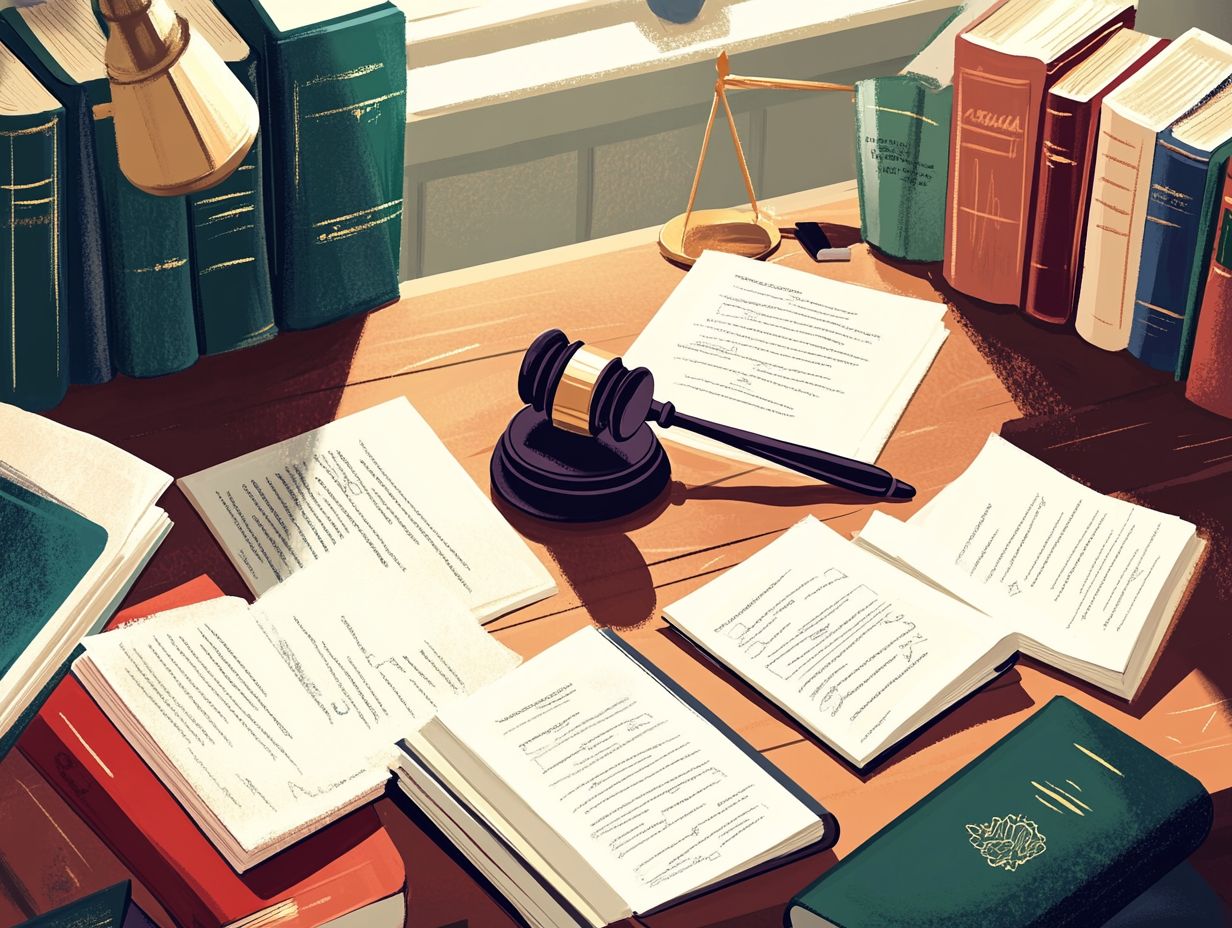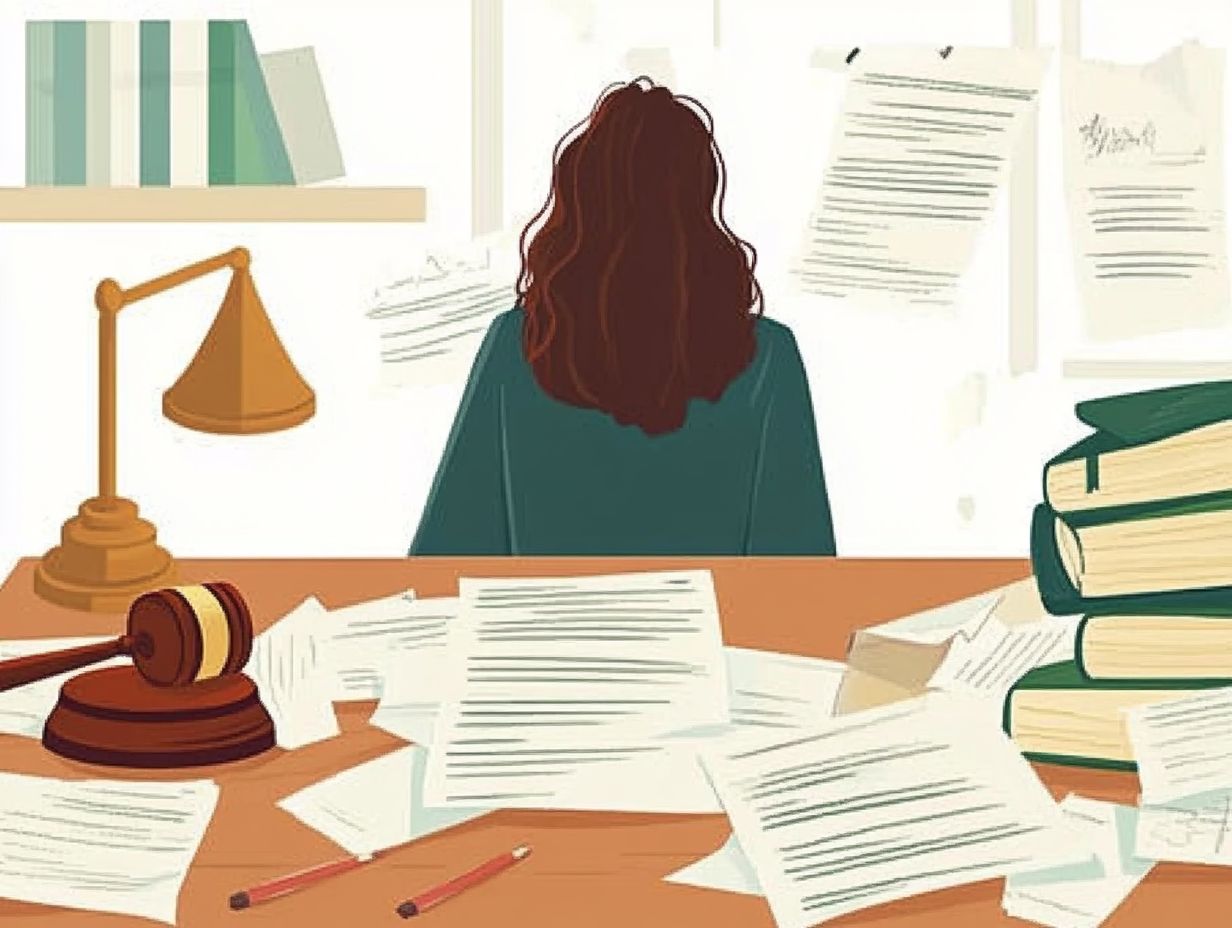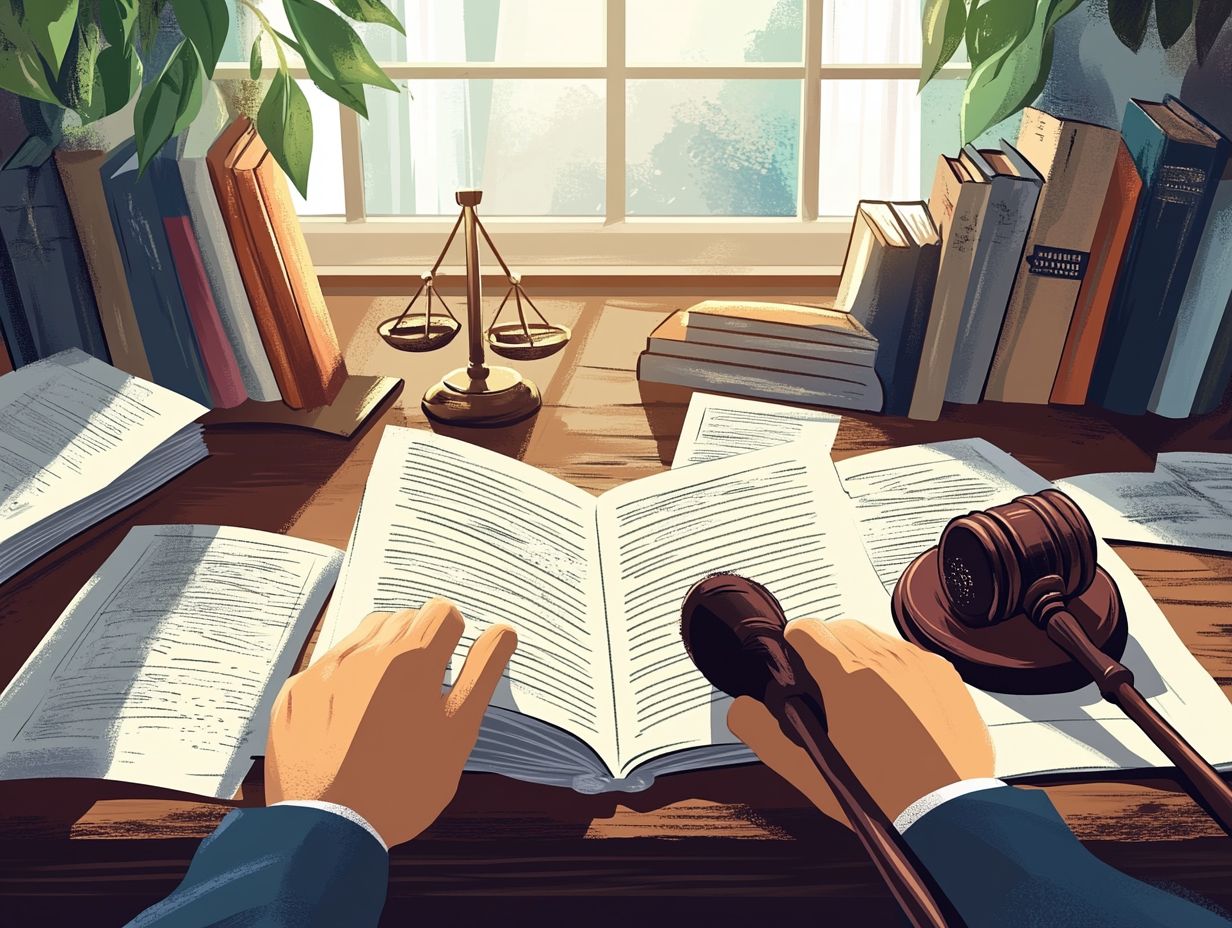Can Home Insurance Cover Legal Fees?
Homeowners Insurance is often perceived as a safety net for your property. Yet, many homeowners tend to overlook a crucial element: legal fees.
Understanding the details of your insurance policy what it covers and what it leaves out can be pivotal when unexpected legal issues arise.
This article reveals what you must know about home insurance coverage. It highlights the types of legal fees that may be included, guides you on how to file a claim, explores alternative protection options, and offers tips for selecting the right policy.
Continue reading to ensure you re fully informed and prepared for any eventualities.
Contents
- Key Takeaways:
- Understanding Homeowners Insurance Coverage
- Legal Fees and Homeowners Insurance
- Filing a Claim for Legal Fees
- Alternatives to Home Insurance Coverage
- Tips for Choosing a Home Insurance Policy
- Frequently Asked Questions
- Can Home Insurance Cover Legal Fees?
- What types of legal fees can home insurance cover?
- Does home insurance cover all legal fees?
- Will my home insurance cover legal fees if I am sued for something unrelated to my property?
- What should I do if I need to file a legal claim covered by my home insurance?
- What if my home insurance does not cover legal fees for a specific type of lawsuit?
Key Takeaways:

While Homeowners Insurance typically covers property damage and personal liability, it may also provide coverage for legal fees in certain situations. Legal fees that may be covered include those related to property damage, personal injury, and defending against lawsuits brought against the homeowner. It is important to carefully review the coverage and exclusions of your Homeowners Insurance policy. Additionally, consider alternative options for legal protection to ensure you are adequately protected.
Understanding Homeowners Insurance Coverage
Understanding Homeowners Insurance coverage is crucial for you as a homeowner. It ensures that your property and assets are well protected.
This insurance acts as a robust financial safety net against a range of perils, from property damage to bodily injury. It includes liability coverage for personal injuries that may occur on your property.
It s essential for you to comprehend how your Homeowners Insurance policy operates what s covered, the extent of your coverage, and the consequences of any excluded claims. By grasping these details, you can make informed decisions about your insurance needs.
What is Covered by Homeowners Insurance?
Homeowners Insurance generally encompasses a variety of incidents that could lead to property damage or bodily injury. This insurance includes multiple types of coverage designed specifically to protect your investment and provide you with peace of mind.
Dwelling coverage safeguards the physical structure of your home, while personal property coverage ensures that your belongings inside are protected.
Liability protection is vital, especially in cases involving injuries on your property, such as deck collapses or swimming pool incidents. For example, if a guest sustains an injury from a faulty deck, your liability coverage will handle medical expenses.
Dog bites can lead to significant claims and are typically covered by this insurance, highlighting just how crucial it is for homeowners like you.
Legal Fees and Homeowners Insurance
Legal fees can pose a substantial burden for homeowners, especially when faced with a civil lawsuit related to property issues. Fortunately, Homeowners Insurance often includes provisions for legal expenses arising from liability claims, offering essential financial support during litigation.
It s crucial for homeowners to understand how these legal fees fit into their insurance coverage. Many insurance providers present options like umbrella policies, which are additional insurance that covers more than your standard policy, enhancing protection against unexpected legal costs.
This proactive strategy can significantly alleviate the financial strain of unforeseen legal challenges.
Types of Legal Fees Covered

Homeowners Insurance can provide coverage for various legal fees associated with civil lawsuits and liability claims. This includes essential expenses like attorney fees for legal representation, court costs during litigation, and potential settlements that might arise if a claim is resolved out of court.
Understanding the specific legal coverage outlined in your Homeowners Insurance policy is crucial. It can significantly influence your financial well-being in the event of a lawsuit. For instance, if a neighbor slips and falls on your property, your insurance can help cover the related legal costs, easing some of the financial burden that can accompany such unexpected situations.
Being aware of these details ensures you are better equipped to manage claims effectively.
Have you considered how legal fees could impact your finances? Don’t wait check your Homeowners Insurance policy today!
Limits and Exclusions
Understanding the limits and exclusions of your homeowners insurance policy is essential for effective risk management. This knowledge is crucial because many homeowners may not realize that liability limits generally range from $100,000 to $500,000. This range can significantly impact the financial support available during unforeseen incidents.
While the policy may cover legal fees in liability claims, certain exclusions such as intentional damage or pet-related incidents could leave you vulnerable. Without adequate coverage, the outcome of claims can shift dramatically, potentially leading to financial strain.
Regularly reviewing your policy ensures that the limits align with your personal circumstances. Taking action now protects you from surprises later!
Filing a Claim for Legal Fees
Filing a claim for legal fees under your homeowners insurance demands careful attention and thorough documentation. You need to understand the process to ensure a seamless claims experience. Start by promptly notifying your insurance provider about the incident that gave rise to the civil lawsuit or related legal expenses.
Accurate documentation is paramount, as insurance companies will require compelling evidence to assess the legitimacy of your claim. This means gathering essential records, including legal bills, incident reports, and any other supporting materials that bolster your case.
By understanding the necessary steps, you can significantly alleviate the pressure of unforeseen legal fees.
Steps to Take and Documentation Needed
When you file an insurance claim for legal fees, it s essential to adopt a systematic approach to ensure you gather all necessary documentation. Start by collecting itemized bills that clearly outline the legal services you ve received.
It s equally important to maintain a record of any correspondence with your legal counsel, as this will highlight the nature of the services and the communication related to your case.
Compile incident reports or any relevant documentation that explains the circumstances necessitating legal services. Pay close attention to the specific forms required by your insurance provider; incomplete submissions can lead to delays in the claims process.
Maintaining clear and consistent communication with the insurance company is crucial. This can pave the way for a smoother resolution and help prevent any potential misunderstandings.
Alternatives to Home Insurance Coverage

For homeowners looking to elevate their legal protection beyond the confines of standard homeowners insurance, exploring alternatives can prove advantageous. While homeowners insurance delivers crucial coverage for both property and liability, it often falls short of addressing all potential legal expenses stemming from accidents or civil lawsuits.
Many insurance providers offer specialized legal protection products designed to cater to your unique needs as a homeowner. An umbrella policy, for instance, adds extra liability coverage that goes beyond your standard home insurance.
By understanding these alternatives, you empower yourself to make informed decisions, enhancing your overall protection against possible legal challenges.
Other Options for Legal Protection
Homeowners have a wealth of options for legal protection that go beyond their homeowners insurance policy. One effective alternative is standalone liability insurance, which provides an additional layer of coverage against claims of bodily injury or property damage that may arise during everyday activities.
Legal expense insurance is another valuable resource, covering legal fees and court costs in the event of a dispute. This ensures you won t be left scrambling when issues arise.
Umbrella policies act as a safety net, extending coverage limits on your existing policies and filling in gaps that traditional homeowners insurance might overlook. By incorporating these options into your overall legal protection strategy, you can significantly bolster your security and enjoy greater peace of mind.
Tips for Choosing a Home Insurance Policy
Choosing the right home insurance policy is a crucial decision for homeowners, significantly influencing financial security during challenging times.
To ensure adequate protection, carefully consider various factors, including coverage limits, the types of incidents covered, and the specific risks associated with your home.
Ask the right questions to empower your decision:
- The extent of liability coverage
- Whether legal fees are included
- How excluded claims could impact your overall protection
By thoroughly understanding these elements, you empower yourself to select a policy that truly aligns with your unique needs.
Factors to Consider and Questions to Ask
When selecting a homeowners insurance policy, many factors come into play that can significantly influence your coverage and overall protection.
It’s essential to look at important factors like how much coverage you have to ensure adequate financial support in case of a loss. You’ll also want to consider the various types of coverage available, including liability and personal property protection.
Don’t overlook deductibles; they can greatly impact your expenses when you make a claim.
When speaking with insurance agents, ask questions that illuminate critical details, such as:
- The extent of legal protection offered
- Any exclusions related to specific claims
- How different deductible options can affect your premium costs
Gaining clarity on these points will help you build a strong foundation for making a well-informed decision.
Frequently Asked Questions

Can Home Insurance Cover Legal Fees?
Yes, home insurance can cover legal fees under certain circumstances.
What types of legal fees can home insurance cover?
Home insurance can typically cover legal fees related to lawsuits or legal disputes arising from incidents on your property, such as personal injury lawsuits or property damage claims.
Does home insurance cover all legal fees?
No, home insurance typically only covers legal fees for specific types of incidents, and there may be limits on the amount of coverage provided. For a deeper understanding, you might want to explore whether home insurance can cover renovation costs.
It depends on the specific terms and coverage of your home insurance policy. For instance, does home insurance cover home office expenses? Some policies may offer coverage for legal fees in certain types of lawsuits, such as defamation or libel claims.
What should I do if I need to file a legal claim covered by my home insurance?
If you believe you have a valid claim covered by your home insurance, contact your insurance provider right away to discuss the details and initiate the claims process. They will provide guidance and assistance throughout the process.
What if my home insurance does not cover legal fees for a specific type of lawsuit?
If your home insurance does not cover legal fees for a specific type of incident, you may need to seek other options for covering those costs, such as hiring a lawyer on your own or seeking coverage through a different insurance policy.
It s important to review your insurance policy carefully and understand the coverage it provides.





